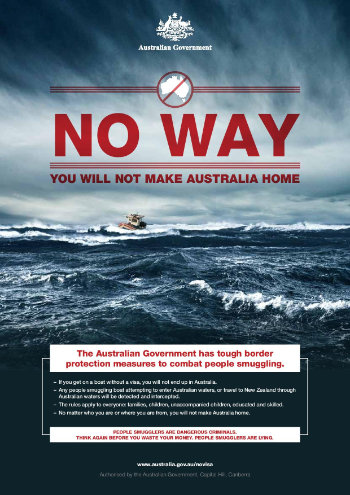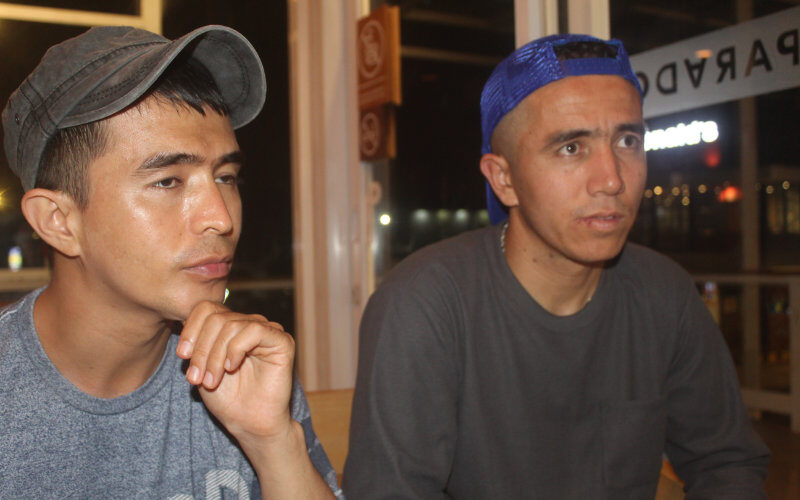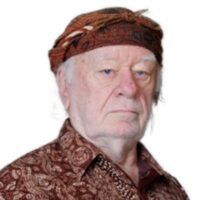The return of people smuggling into Northern Australia could throw some Labor votes overboard in the upcoming election. Duncan Graham reports on asylum seekers from Indonesia.
More than 200 asylum seekers from Afghanistan, Pakistan and Bangladesh are hanging around Kupang on Indonesia’s Timor Island, hoping for a safe refuge to start new lives. Some, like Hazara tailor Sayed Nouroz, 28, have been waiting for more than a decade.
“I want to go to Australia and work. I have skills. My cousin is in Sydney.” His chef mate Hafizullah Hashimi, 28, has eyes on marrying a woman in Australia originally from his village. In the trendy restaurant where they were interviewed, young Indonesians showing bare midriffs and shoulders laughed loudly with their partners – a sight now not seen in Kabul.
“We are not offended,” said Hafizullah. “We should all live in peace and follow our own ways. They are our fellow humans, and we are theirs. Islam teaches peace.”
People smugglers still thrive
Both men said their families had paid people smugglers about $US7,000 each to get to Indonesia but had not been offered passages beyond: “We don’t want to break the law.”
A week before MWM arrived in Kupang ten men from Bangladesh were picked up by local immigration staff, now trying to work out how they got to the city. Fifteen others arrived in December – 44 in July. All were said to be heading to Oz. The numbers were only those who’d been caught.
The desperate are hoping to find famished local fishers willing to ferry them across 830 km of open sea and be tipped out on a North Australian beach.
If more try to arrive in big numbers, the issue of people smuggling could flare again as a campaign issue arousing xenophobia would suit Opposition Leader Peter Dutton.
Indonesia isn’t a signatory to the 1951 Refugee Convention and its 1967 Protocol. However, it must protect refugees under its domestic laws and international commitments. The quality of this protection differs widely.
Afghan crisis
For the decade since 2013, when Kabul fell to the Taliban, Canberra has given almost 13,000 “Offshore Refugee and Humanitarian visas” to Afghans. There are 230,000 on the waiting list. The Australian community is 72,000 strong and goes back to 19th-century camel drivers.
Internationally, we’re bit players. By mid-2024, Iran was the world’s largest refugee host, sheltering 3.8 million people with 99 per cent from Afghanistan, according to the Washington-based Migration Policy Institute.
Our border protection is no well-resourced ring of steel but relies on community spotters.
Mid-2024 media reports claimed the Australian Border Force (ABF), an agency of Home Affairs, paid fishermen with fuel for using their own dinghies to catch five unlawful arrivals believed to be from Senegal.
In November, Garngi rangers rescued four men – probably Chinese – in desperate conditions, claiming they’d paid $US6,000 to be shipped to the Australian coast and been abandoned in mangroves. They’d avoided ABF patrols.
The boats have (almost) stopped; but Indonesia’s people smugglers are thriving?
Borders remain closed

ABF poster
Last decade, Canberra ran a campaign against people smugglers using posters and pamphlets in spine-reinforcing military jargon ‘Operation Sovereign Borders’ distributed in southern fishing ports. There’s no evidence in Kupang, the largest port in the region of any such propaganda. Fishers claimed it was a hoax.
Australian media has reported that at least 213 in more than 15 boats have made it to Australian waters or land in the past decade. Since it was formed in 2015, the ABF has been dogged by reports of a poor culture and its creation as a mistake.
The late James Goldrick, an adjunct professor at the ANU’s Strategic and Defence Studies Centre alleged that “the seaborne element of our civil maritime security effort is facing serious problems.”
Figures and nationalities are hard to confirm because the ABF won’t talk to MWM. Nor will Indonesian Immigration in Kupang, so government claims and Opposition versions are a churn of confusion.
Home Affairs Minister Tony Burke has said no people smuggling ventures have been successful under his government. People who come to Australia by boat “have zero chance of success” because their customers get shipped to detention in Nauru before claiming asylum.
Stirring the pot
In November, following reports of more intruders, shadow home affairs minister James Paterson was reported as saying that “if confirmed, this will be the eighth boat that has breached our borders and reached the Australian territory since Labor was elected, and the 23rd attempted people smuggling venture .”
Those considered economic chancers from China and Bangladesh are deported, but the Afghans are a special case, usually Hazaras following the Shi’ite version of Islam as against the Taliban Sunni; being killed is a reality if they return.
The Hazara are more Western in appearance, have lighter skins and can be identified through their accents.
Genuine refugees
The men MWM spoke to said they had not been in the military but had seen death and violence that had damaged their lives. As the interview progressed, their smiles started to slip. “We have a thousand issues,” said Hafizullah, though not forcefully. ”it’s difficult to explain.”
Particularly to an Australian with a wallet of cash and cards plus air tickets out of Kupang.
Sunni-majority Indonesia has often persecuted the Shi’ite but seems to leave the Afghans alone while they wait for resettlement in a third nation. Timor is largely Christian
Indonesia is legally obligated to protect genuine refugees due to its domestic laws and international commitments. There are about 15,000 in Indonesia recognised by the UNHCR, mainly camped in Cisarua, a hill town outside Jakarta, along with asylum seekers from other countries.
They get an allowance of about Rp 1,750,000, a month – $170 – from the UN International Organisation for Migration. Most of the 170 Afghans in Kupang are not in detention but camped in the decrepit Hotel Ina Boi with 47 residents, including three children born in Indonesia. All are single young men apart from three married women.
Two other discarded hotels in the city are also used for asylum seekers. They’re confined to Kupang, gates locked at 10 pm.
The two Hazara men who spoke to MWM at length in excellent self-taught English and Indonesian said they had to keep fit running on the beach, playing futsal and studying languages. They’ve bought a motorbike.
It’s a battle not to get depressed. We must be disciplined. Some of our colleagues are suffering mental illness from the delays and have self-harmed.
The overdrive smiles slip down the fear gears.
“We are not free. Every month, IOM comes to check on us, and every day, Immigration. We ask when we’ll be moved. They say ‘be patient, soon’. There’ve been nationwide peaceful protests. Months turn into years. In Afghanistan, I had big dreams of freedom. Now I find it difficult to sleep.”
Till recently, the selection of asylum seekers for resettlement was government business. Australia has now followed Canada and developed the Community Refugee Integration and Settlement Pilot “to give groups of locals the opportunity to welcome refugees … supporting them from day one.”
Duncan Graham has a Walkley Award, two Human Rights Commission awards and other prizes for his radio, TV and print journalism in Australia. He now lives in Indonesia.

